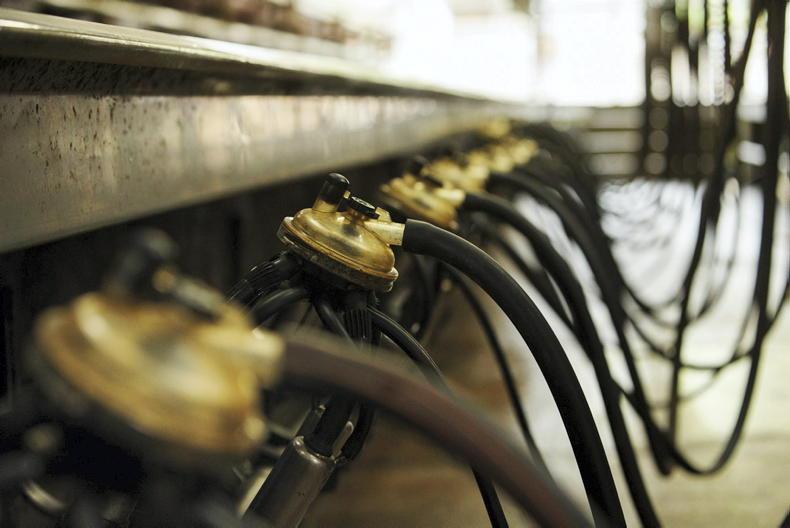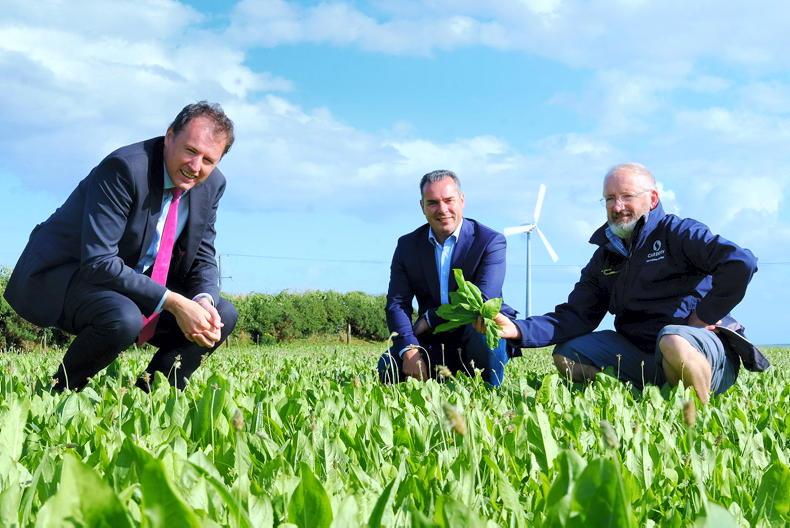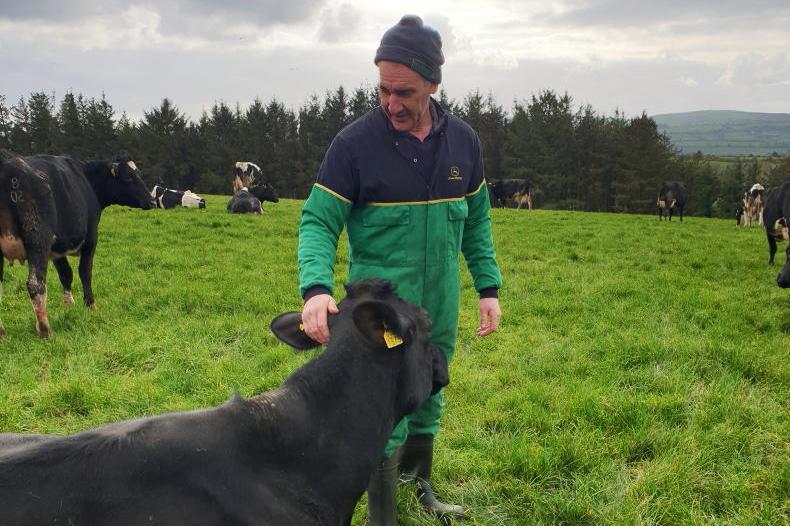“I want to be seen as part of the solution, not part of the problem,” Cork dairy farmer Cyril Draper says about his University College Cork (UCC) diploma in environmental science and social policy.
The Enniskeane man is one of 38 farmers who have completed the diploma through Carbery.
Its partnership with UCC came about in 2017 when a pilot project with a group of farmers from the Carbery Greener Dairy Farms programme was launched.
The goal was to ensure the practical learnings that farmers have taken from Carbery’s programme were being academically recognised by UCC in what’s known as recognition of prior learning (RPL).
Practical skills
Put simply, UCC recognises the experience and practical skills learned by farmers who participated in the Greener Dairy project. They are awarded over 60% of the credits needed for UCC’s level seven diploma in environmental science and social policy.
The farmers then get the option to achieve the remaining credits needed for the UCC diploma in a more formal learning environment.
Some of them may not have had the chance to do their Leaving Cert and here they are with a diploma in environmental science and social policy.
"It really gives those farmers huge confidence in themselves for what they have achieved,” says director of sustainability at Carbery Enda Buckley.
"And for us, it shows that our farmers are well ahead of the curve in terms of being interested in, and educated about, what it is to farm sustainably.”
I left school at 15 after my Inter Cert
Draper is one of those whose formal school education ended at a young age.
“I left school at 15 after my Inter Cert, so this was a great project to show what I could do, years later, at the age of 48.”
“I was chuffed,” the Bandon Co-op supplier tells the Irish Farmers Journal about completing the diploma.
“It’s unusual, in that we worked on the practical side of things first and then moved into the theory. I found it really made me think about how society looks at farmers.
“At the moment, all the talk is about agriculture’s emissions, but there isn’t a word mentioned about airplanes and cargo ships, which are a huge contributor to emissions.
“I think everyone, not just farmers, needs to do something about their emissions – everything we do has emissions associated with it, whether it’s driving to the shop or getting on a plane.”
As part of Carbery’s Greener Dairy programme, Draper has focused on a number of areas where his farm can improve its carbon footprint and reduce emissions.

These include reducing the water requirement on the farm, breeding higher EBI cows, utilising more grass and more. Slurry is spread using a trailing shoe.
For example, parlour washings are recycled through the plate cooler, making more use of it.
“In the early 80s, only my best cow was doing 1,100 to 1,200 gallons of milk, but now my herd average is that,” he says.
Draper is keen to see the Government support for solar panels on the roofs of farm buildings too.
He muses on what tools could be most effective for driving farmer change.
“If the difference between using CAN and protected urea is 8% emissions, then why don’t we ban CAN?” he asks.
Carbery farmers in the Greener Dairy programme have seen a 15% reduction in the carbon footprint of their farms and the programme has shown that for every one litre of milk produced on those farms, it takes just 6.5 litres of water to produce it. The figure in other countries would be multiples of 6.5.
Farmer-led changes
Farmer-led changes will be most effective in the long run, he believes.
“If a farmer can show how he saved money or made positive changes for his or her farm, it will not be a hard sell. It’s better than a crap idea dreamed up by someone in an office,” he says.
While many in the industry bemoan what they call “farmer bashing”, the Cork farmer is more upbeat.
“Farmers have nothing to fear. Our job is to feed the world,” he says.
“I like what I do and I am proud of what we do. We have a social conscience,” he says. “I want a future for my farm.”
He hopes that in the rush to cut national emissions, “we don’t get too carried away in cutting production”.
Belinda Gascoigne, who manages the programme for UCC, explains: “Through the RPL process, UCC has been able to highlight and validate the tremendous work that the farmers have completed in making their farms both more sustainable and profitable.”
Initially, 12 dairy farms took part in the programme. Over the years, this has risen to 70.
Carbery farmers have been able to measure carbon, water and energy footprints at an individual farm level, as well as support on soil and nutrient management and water quality.

Minister Charlie McConalogue visits Carbery Group's Farm Zero C project at Shinagh dairy farm.
The programme was a precursor to many of the measures in the Teagasc MACC curve to reduce farm emissions and also the starting point for some of the approaches being trialled as part of Carbery’s Farm Zero C project.
Carbery is now taking applications for participants for next year’s programme. Any of its suppliers who are interested are encouraged to get in touch with any member of the Carbery sustainability team.
“I want to be seen as part of the solution, not part of the problem,” Cork dairy farmer Cyril Draper says about his University College Cork (UCC) diploma in environmental science and social policy.
The Enniskeane man is one of 38 farmers who have completed the diploma through Carbery.
Its partnership with UCC came about in 2017 when a pilot project with a group of farmers from the Carbery Greener Dairy Farms programme was launched.
The goal was to ensure the practical learnings that farmers have taken from Carbery’s programme were being academically recognised by UCC in what’s known as recognition of prior learning (RPL).
Practical skills
Put simply, UCC recognises the experience and practical skills learned by farmers who participated in the Greener Dairy project. They are awarded over 60% of the credits needed for UCC’s level seven diploma in environmental science and social policy.
The farmers then get the option to achieve the remaining credits needed for the UCC diploma in a more formal learning environment.
Some of them may not have had the chance to do their Leaving Cert and here they are with a diploma in environmental science and social policy.
"It really gives those farmers huge confidence in themselves for what they have achieved,” says director of sustainability at Carbery Enda Buckley.
"And for us, it shows that our farmers are well ahead of the curve in terms of being interested in, and educated about, what it is to farm sustainably.”
I left school at 15 after my Inter Cert
Draper is one of those whose formal school education ended at a young age.
“I left school at 15 after my Inter Cert, so this was a great project to show what I could do, years later, at the age of 48.”
“I was chuffed,” the Bandon Co-op supplier tells the Irish Farmers Journal about completing the diploma.
“It’s unusual, in that we worked on the practical side of things first and then moved into the theory. I found it really made me think about how society looks at farmers.
“At the moment, all the talk is about agriculture’s emissions, but there isn’t a word mentioned about airplanes and cargo ships, which are a huge contributor to emissions.
“I think everyone, not just farmers, needs to do something about their emissions – everything we do has emissions associated with it, whether it’s driving to the shop or getting on a plane.”
As part of Carbery’s Greener Dairy programme, Draper has focused on a number of areas where his farm can improve its carbon footprint and reduce emissions.

These include reducing the water requirement on the farm, breeding higher EBI cows, utilising more grass and more. Slurry is spread using a trailing shoe.
For example, parlour washings are recycled through the plate cooler, making more use of it.
“In the early 80s, only my best cow was doing 1,100 to 1,200 gallons of milk, but now my herd average is that,” he says.
Draper is keen to see the Government support for solar panels on the roofs of farm buildings too.
He muses on what tools could be most effective for driving farmer change.
“If the difference between using CAN and protected urea is 8% emissions, then why don’t we ban CAN?” he asks.
Carbery farmers in the Greener Dairy programme have seen a 15% reduction in the carbon footprint of their farms and the programme has shown that for every one litre of milk produced on those farms, it takes just 6.5 litres of water to produce it. The figure in other countries would be multiples of 6.5.
Farmer-led changes
Farmer-led changes will be most effective in the long run, he believes.
“If a farmer can show how he saved money or made positive changes for his or her farm, it will not be a hard sell. It’s better than a crap idea dreamed up by someone in an office,” he says.
While many in the industry bemoan what they call “farmer bashing”, the Cork farmer is more upbeat.
“Farmers have nothing to fear. Our job is to feed the world,” he says.
“I like what I do and I am proud of what we do. We have a social conscience,” he says. “I want a future for my farm.”
He hopes that in the rush to cut national emissions, “we don’t get too carried away in cutting production”.
Belinda Gascoigne, who manages the programme for UCC, explains: “Through the RPL process, UCC has been able to highlight and validate the tremendous work that the farmers have completed in making their farms both more sustainable and profitable.”
Initially, 12 dairy farms took part in the programme. Over the years, this has risen to 70.
Carbery farmers have been able to measure carbon, water and energy footprints at an individual farm level, as well as support on soil and nutrient management and water quality.

Minister Charlie McConalogue visits Carbery Group's Farm Zero C project at Shinagh dairy farm.
The programme was a precursor to many of the measures in the Teagasc MACC curve to reduce farm emissions and also the starting point for some of the approaches being trialled as part of Carbery’s Farm Zero C project.
Carbery is now taking applications for participants for next year’s programme. Any of its suppliers who are interested are encouraged to get in touch with any member of the Carbery sustainability team.








 This is a subscriber-only article
This is a subscriber-only article











SHARING OPTIONS: